Course 3 in the EDS Awareness Nursing Continuing Education Program
Course Description
Ehlers-Danlos Syndromes (EDS) are genetic conditions that can have a long-term impact on most body systems and all areas of a person’s life. Historically, EDS has been much neglected and, due to the lack of the identified gene defect, hEDS (hypermobile) takes years to be recognized and treated. Even after diagnosis, most patients find providers unprepared to manage their complex symptoms. The burden of advocating for these patients and learning to navigate a complex health system with little knowledge of this disorder falls on patients, families and caregivers. Many times, this requires expensive travel, time away from work and changes in short and long-term plans. All variables that add significant stress to individuals and families; resulting in personal, emotional and financial loss. Personal experience demonstrates that it takes an average of a year or more to address one joint issue or new problem due to lack of expertise or dismissive attitudes. Imagine having this experience repeatedly with one joint for body system after another. This is pain, loss and heartache on a level that most of us cannot relate.
The course presented is through the voice of Mattie, a 22-year-old female diagnosed with hEDS. Through her voice, she provides a unique perspective on patient experience. She discusses what she and her family learned from the trajectory of symptom onset through diagnosis and beyond. This is her story, told to help others understand the feelings of frustration and poor outcomes that result from a lack of knowledge. Survey results from 2019 confirmed this lack of knowledge related to EDS as reported from healthcare providers, as well as a consensus from EDS patients that the healthcare system does not listen or understand their disorder. We desperately need to care about how our attitudes as providers affect these patients and their quality of life. Learning more about EDS is a great place to start. Thank you for taking time to hear Mattie’s story.
What We Will Cover
1. The patient experience of diagnosis and treatment
2. Possible reasons this is so hard to recognize
3. Suggestions for Advocacy and Navigation
4. Consequences of delayed treatment; what the patient wants you to know.
Learning Outcomes
1. Recognize attitudes related to EDS patients and how it affects the patient and families.
2. Identify two (2) factors that contribute to frustration and poor outcomes for EDS patients and families.
3. Recognize two (2) evidence-based principles of patient care that will improve outcomes for EDS patients and
families.
4. Recognize two (2) ways to advocate for the patient with EDS and their families.
Contact Hours and Requirements
This course should take about an hour. Upon completion, you will get a certificate of completion for one (1) contact hour of continuing nursing education credit.
To earn contact hours you will:
1. Complete all course sections
2. Answer each question
3. Review each quiz discussion
4. Complete the course evaluation
This continuing nursing education activity is provided by EDS Awareness/ Chronic Pain Partners. It was approved by the Wisconsin Nurses Association, an accredited approver by the American Nurses Credentialing Center’s Commission on Accreditation.
Faculty
Melinda G. Baker, DNP, APRN, ACCNS-AG
Mbaker0096@gmail.com
Melinda.baker@kctcs.edu
Disclosures
There are no relevant conflicts of interest to disclose.
Course Expiration
Contact hours awarded for this course until November 20, 2021
–
– YOU MUST BE REGISTERED TO ATTEND THIS COURSE FOR THE FIRST TIME
If you have not registered click below.
